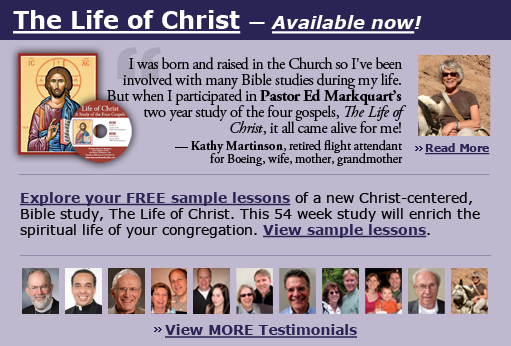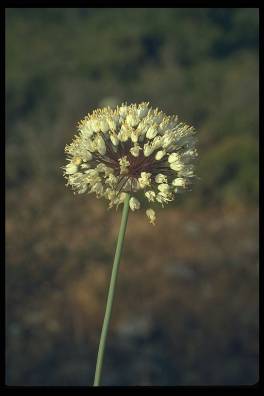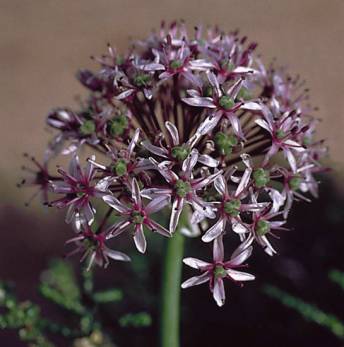
Christmas
Easter
Pentcoest
All Saints
Christ The King
Confirmation
Palm/Passion
Reformation
Stewardship
Books of the Bible
Lenten Series
Christmas Dramas
Videos
Series A - Matthew
Series B - Mark
Series C - Luke
Series D - Other
To contact
Edward F. Markquart
info@sfs.com

Series B Matthew 6:25-35 The following Bible study is from a larger course entitled, THE LIFE OF CHRIST: A Study in the Four Gospels. This 54 week course for the laity will be available for congregations in 2006.Basic text for the course: SYNOPSIS OF THE FOUR GOSPELS, Kurt Aland, English Edition, P. 139. Introduction: A Brief Review Of The Sermon On The Mount
#64. On Treasures Matthew 6:19-21 -Do not store up for yourselves treasures on earth, where moth and rust consume and where thieves break in and steal; “Treasures on earth.” Treasures on earth = material possessions. That is, material possessions can be eroded because of moths, rust and thieves. Jesus is warning us about the transitory nature of all material possessions. -But store up for yourselves treasures in heaven, where neither moth nor rust consumes and where thieves do not break in and steal. “Lay up for yourselves treasures in heaven.” Highlight. Jesus was teaching that our eternal Father will reward us with everlasting life and everlasting love in our future in heaven. As has been said, “deeds of kindness are treasures in heaven.” Later in the gospels, we will discover that "treasures in heaven" are the actions of love for other people. "Treasures in heaven = actions of love for others. -For where your treasure is, there your heart will be also. This teaching of Jesus is so profoundly true. That which we treasure the most on earth is where our heart is. Martin Luther used this phrase as a definition of god. That is, what we human beings treasure most in this world is our god. -Sell your possessions and give alms. (Only Luke) Luke’s command is much stronger; that is, we Christians are to sell our possession and help the poor via giving of alms. This is precisely what the early Christian community was asked to do in Luke’s Book of Acts. Christians were so sell possessions and share their proceeds with the needy (e.g. the story of Ananaias and Sapphira in Acts 5.) #65. The Sound Eye Matthew 6:22-23 -The eye is the lamp of the body. This is another profound and simple teaching of Jesus. What do you see around you? What you see brings light or darkness into your body and soul. If you see God’s beauty, God’s beauty comes into you. If you focus on evil, that evil will come into you. We all know that. Jesus is telling us the truth of what we already know. The eye is like a window which allows light into the body. We all like windows in our homes because they let light in. So also, our eyes are lights to our bodies and they let light in. Many things can distort and discolor our vision e.g. prejudice, jealousy and self conceit (Barclay). Jesus wants the eyes of our bodies, hearts and minds to be healthy and God pleasing, so that the actions of our eyes, hands, and feet will be healthy and God-pleasing. The scribes and the Pharisees are often referred to as blind and Jesus heals people of their blindness. Jesus heals people who were physically blind and spiritually blind. The Pharisees are examples of people who had spiritually blind eyes and did not see the light of God and Jesus Christ. A fundamental problem for most human beings is our eyes that see the material prosperity of others and covet that prosperity. This teaching about eyes and eyes being healthy is placed in the context of material possessions. The context of this particular teaching is not about "sexual lust" but about "material lust." We human beings have a deep seated problem with our "material lust" where our eyes are too often attracted to the material prosperity of people around us. As human beings, we steal glances not merely of sexual bodies around us but of the material prosperity of people walking by. Their clothes. Their jewelry. Their shoes which are all signs of wealth. -So, if your eye is healthy, your whole body will be full of light; -But if your eye is unhealthy, your whole body will be full of darkness. If our eyes are drawn to wealth and material prosperity, our inner self will be filled with covetousness and envy. -If then the light in you is darkness, how great is the darkness! When our hearts are filled with greed, envy, and covetousness, our hearts are indeed dark. #66. On Serving Two Masters Matthew 6:24 "No one can serve two masters; for a slave will either hate the one and love the other, or be devoted to the one and despise the other. You cannot serve God and wealth. -No servant can serve two masters. The historical background of this teaching is a New Testament world of servants/slaves and masters. In Jesus' day, a slave was not a servant but a genuine slave. A slave was owned by a master and did not have any legal rights. A slave was property. Jesus was teaching that people would be slaves either to mammon (material possessions) or to God. The simple question is this: Who owns your heart? To whom are you a slave? Some thing or some one owns you. Is it God? Or is it material possessions? -You cannot serve God and mammon. A follower of Christ cannot straddle the fence about money and material possessions. A Christian is to serve Christ or serve material possessions. There is no middle ground. In Jesus’ previous teaching, we heard that all material possessions disintegrate because of moths (clothing), rust/decay (iron), and thieves (stealing.) It is much wiser to be a slave to the eternal God than temporary material possessions. Near the word, “mammon,” in Luke’s Gospel, write the word, “unrighteous.” Mammon is always unrighteous for Jesus in the book of Luke. Also write the phrase, “dangerous stuff.” Material possessions are dangerous stuff, and material possessions enticer people away from the love and ways of God. In these teachings, Jesus is warning us about the dangers of money and how money, although it can be use for blessings and generosity, is inherently seductive and can easily seduce us away from our love of God and our neighbor. We recall the phrase: “We are to love God and use money. We are not to love money and use God.” So many people turn this phrase around in our hearts and minds. Notice that the wording of Matthew and Luke is precisely parallel, except for the first word. There are times when Q seems to be a written document so that Matthew and Luke copy the exact same words. There are other times (e.g. the teaching about the Sound Eye) that Matthew and Luke’s words are not precisely parallel but parallel only in thought. In other words, at times Q seems like a written document that was copied verbatim. At other times, Q seems like an oral document, where the words are not copied verbatim but flow in the sequence of ideas. Often, the setting of the teaching is helpful in understanding a particular teaching. Luke’s setting is helpful in understanding this particular passage about the two masters. Turn to Luke 16:1-15 so we can see this verse placed in another context.We will encounter several teachings in Luke about “mammon.” Luke 16:9, “Make friends for yourselves with unrighteous mammon (material possessions) so that when it fails (moth, rust, stolen), they (lovers of material goods) may receive you into their eternal habitations (hell).” There is wonderful sarcasm here. Luke 16:10-12. “If you have not been faithful in your use of unrighteous mammon, who will entrust you to true riches?” There is wonderful sarcasm here. Again, underline and emphasize the word, “unrighteous.” In both teachings of Jesus, he uses the word, “unrighteous,” to describe money. Jesus is implying that money and material possessions are very seductive and that we as human beings can begin to find our security in money and material possessions rather than in God and the ways of God. It happens to all of us. People in poorer societies know how fleeting material wealth can be; whereas people in richer societies start to secretly believe that monetary wealth is the source of inner satisfaction, status, security, and the good life. In all societies, rich and poor, there is something about material possessions that they become a hidden but an all-consuming goal. Luke 16:13 “You cannot serve God and mammon.” The word, unrighteous, is implied in the word, mammon. Luke 16:14-15, “The Pharisees who were lovers of money scoffed at him.” This is the real issue with the Pharisees. That is, the Pharisees were super religious but they were also lovers of money (and what money could buy) more than God and the ways of the kingdom of God. Jesus then said (and highlight,) “What is exalted among men (mammon) is an abomination in the sight of God.” Human beings admire the rich and affluent, but God does not buy into those superficial values. Also underline that “God knows the heart” and God knows our hearts about our secret love of money. God knows if we have that secret love of materialism. The setting of Jesus’ teaching about the two masters seems to be more informative in Luke’s setting than in Matthew’s.
(As a footnote, I would like to remind the class that I am a thorough-going capitalist who believes in the accumulation of wealth in order to perpetuate economies in a modern world. Modern capitalist economies need the accumulation of wealth and technology to create good jobs and grow wealth for a nation. Modern capitalist economics need fair and equitable democratic values and laws to temper unregulated capitalism. In poor nations, those nations are trying to find ways to get better prices for their commodities, create more non-agricultural jobs and gain more wealth to feed themselves. Knowing that Jesus did not live in a modern world with modern economic systems, Jesus’ teachings about money still ring true and are valid in the 21st century. How do Jesus’ teachings about money relate to our everyday lives in our modern world?) #67. On Anxiety Matthew 6:25-34 (The gospel lesson for Thanksgiving begins here.) -Therefore I tell you, do not worry/be anxious about your life, what you will eat or what you will drink, or about your body, what you will wear. Is not life more than food, and the body more than clothing? “Do not be anxious about your life.” Highlight. The word, “worry/anxious,” is used six times in this passage. Highlight the six references to the word, “worry/anxious:” Verse 25, 27, 28, 31, 34. “What you eat, drink and wear.” Highlight. In verse 25, circle the words “eat, drink and put on.” We, as human beings, after all these centuries, still worry about the basic essentials of life: eating, drinking and clothing. Food, water, and attire. It is rather basic, and we human beings worry about the basics. Jesus lists seven reasons not to worry. Jesus asks several rhetorical questions that lead us to conclusions:
Verse 34 A conclusion. "Therefore, don’t be anxious about tomorrow. Let the day’s own trouble be sufficient for the day." -Look at the birds of the air; they neither sow nor reap nor gather into barns, and yet your heavenly Father feeds them. Are you not of more value than they? We know the answer. We are more valuable than the birds of the air. Of course we are. In Luke's gospel parallels of this passage, the "birds of the air" are identifed as "ravens." We think of ravens. Jesus had other similar teachings about sparrows. From Matthew 10: 29-31: “Are not two sparrows sold for a penny? Yet not one of them will fall to the ground apart from your Father. And even the hairs of your head are all counted. So do not be afraid; you are of more value than many sparrows. From Luke 126-7: "Are not five sparrows sold for two pennies? Yet not one of them is forgotten in God's sight. But even the hairs of your head are all counted. Do not be afraid; you are of more value than many sparrows.” Do not be afraid, for you are more valuable than sparrows." With these words, I began to look on the Internet for birds that are common to Israel, the birds that Jesus was thinking about when he spoke these memorable words. I was thinking Biblically of sparrows and ravens of Israel. The most common bird of Israel is the lowly sparrow. Do you notice the sparrows at your house? Jesus did. Jesus learned lessons from the sparrows. Jesus knew that the Living God our Heavenly Father took care of the sparrows and would also care for us. Jesus would have seen sparrows like this. http://www.birddigiscoping.com/bloghousesp.jpg
Consider the sparrows of the air. Look carefully at God’s lowly sparrows around your house. Do you have time to do that? Are you too busy to stop and see? Are there lessons that the Living God, our Heavenly Father, wants to teach us about life when we carefully watch the lowly sparrows that were sold for a mere penny in ancient Israel? Do you think that the Living God, our Heavenly Father, cares for this sparrow? http://www.birdingisrael.com/birdNews/recentSightings/2006/Black%20headed%20Bunting.jpg
If God cares for the lowly sparrows of the earth which were not worth more than a penny in ancient Jewish society, will not the Living God also care for you and me? Then why do we worry so much? About money. About food. About clothing. What is wrong with us human beings that we don’t trust the Living God, our Heavenly Father, who cares for the birds of the air and the wild lilies of the field? If the living God cares for the birds and lilies, won’t our Heavenly Father also care for us? And Jesus talked about ravens. In the Gospel of Luke’s version of this gospel text, Jesus said, “Look at the ravens.” The following are pictures of ravens from Biblical Israel. What lessons can you learn from the Living God, our Heavenly Father, as you slow down your life to look at the ravens and the blackbirds around us. http://www.justbirds.org/Israele/Fan-tailed%20raven.jpg
It is true. The Living God, our Heavenly Father, takes great care of the ravens.
http://www.mangoverde.com/wbg/picpages/pic189-116-3.html
Then why do we worry so much? About money. About food. About clothing. What is wrong with us human beings that we don’t trust the Living God, our Heavenly Father, who cares for the birds of the air and the wild lilies of the field? If the living God cares for the birds and lilies, won’t our Heavenly Father also care for us? -And can any of you by worrying add a single hour to your span of life? No we can’t. We human beings worry about our health and dying a premature death. We often ask the question of ourselves: “What is the difference between wise concern about our health and foolish preoccupation with our aches and pains?” -And why do you worry about clothing? Jesus assumes that people worry about what we wear. Jesus doesn’t ask us if we are worried about clothing but he assumes that we are. Are you worried about clothing? Most of us in America are sufficiently wealthy that we don’t need to worry about having the basic necessities of clothing to make us warm. We worry more about the style of shoes than having shoes at all. -Consider the lilies of the field, how they grow; they neither toil nor spin, yet I tell you, even Solomon in all his glory was not clothed like one of these. Underline. Highlight. Emphasize. “Consider the lilies of the field.” Almost everyone who has been around Jesus for very long remembers this classic line from the lips of Jesus. Consider the lilies of the field and how beautiful they are. Those lilies don’t worry about how beautiful they are. King Solomon, who was the wealthiest person on earth, was never dressed as beautiful as a lily. We discover that the "lilies of the field" can be translated as the "wild flowers of the field." I am a student of the Internet and go looking for all sorts of information. I went searching for pictures of wild flowers from the Mid East and the land of Israel. Bingo!!! I found an article by Dr. Ori Fragman-Sapir, who is the head scientist at the Jerusalem University Botanical Gardens. His article was entitled “Wild Allium Species in Israel.” www.botanic.co.il/english/research/Allium.htm From this article, I discovered that Biblical lilies such as referred to in the gospel text for today are part of Genus Allium. Genus Allium. There are 250 species of this variety of wild lily. These 250 species are located in the Middle East, from Israel to Turkey to Iran. Dr. Ori Fragman-Sapir informs us that “Alliums are characterized by a tall, erect inflorescence; umbrella-like, all of the flower stalks emerge from one point.” “ Dr. Ori Fragman-Sapir informs us that there are no less than 39 different wild alliums species grow in and around Israel. Now, I would like to show you pictures of some of the 39 different species of this flower from the family of wild lilies in the land of Israel. As we look at these pictures of wild lilies, we need to imagine Jesus picking one of these flowers and carefully and slowly examining intricate beauty, slowly twisting the flower in his fingers and relishing the moment of beauty.
Jesus said, “Look carefully at the wild lilies. See its long stem. Its white petals. How lovely. How delicate. Can you feel its stem in your fingers? Can you smell its fragrance as you bring it up to your nose? Look at the next species of wild lilies in Israel.
We recall that this species of flower called alliums are “characterized by a tall, erect inflorescence. They are umbrella-like, with all of the flower stalks emerging from one point.” We can imagine Jesus picking a single stem of a wild lily and saying, “Look carefully at this particular wild lilies of the field.” Are you too busy to look carefully at the wild lilies of the field? Are you too caught up in your hurried and harried life so that your heart is no longer captured by the beauty and intricacies of wild flowers? Are there lessons about life that the Lord God wants to teach you and me when we look closely at wild flowers? What are lessons about life what we learn when we pause for a moment and study the texture, the detail, the repeated symmetry in the wild lily below.
Notice the next species of alliums. Its color. Its incandescence. The varieties of shades of purple.
Do you think that King Solomon and all the richest people of the world throughout human history were ever more beautifully dressed that this lovely, magical flower? Is there any coat, jacket or piece of clothing more delicate, graceful, and lovely than this flower with its lavender petals and green centers? Why do we worry so much about clothing and what we will wear? Doesn’t the Living God clothe the flowers in splendor? Look at this next beauty? Is there any piece of human clothing more beautiful? King Solomon never had a jacket that pretty, even though he was king and could afford the finest.
-But if God so clothes the grass of the field, which is alive today and tomorrow is thrown into the oven, will he not much more clothe you—you of little faith? If God clothes the lilies, won’t God care for you even more than the lilies? Are you not more valuable to God than the birds of the air and the lilies of the field? Our answer, “Yes, of course.” Then Jesus asks, “Why do you have so little faith that God will care for you?” Jesus rightfully assumes the disciples have little faith and are far too worried about food, clothing, and shelter. “O you of little faith.” Highlight. The issue is to trust God. Once again, we run into that word, “believe” or “have faith.” What God wants from us more than anything in the world is to trust God, believe in him, and believe in his promises to us. God has promised to take care of our essential needs for food, water, and clothing. -Therefore do not worry, Highlight it. Circle it. Memorize it. Put it into your list of sacred Bible verses on page 362 and following. Jesus gives us a command: Do not worry. -Saying, "What will we eat?' or "What will we drink?' or "What will we wear?' Do not worry about food, water and clothing. I think Jesus would add shelter to that list. These are the basics essentials that are needed for life. So how to do we relate these verses to people, including Christians, who are starving, hungry, and thirsty as they live in Third and Fourth World countries? We need to remember the audience/people to whom Jesus was speaking. As Jesus was giving these teachings to his disciples during the Sermon on the Mountain, he knew what issues were important within his disciples’ hearts. Jesus knew that his chosen twelve disciples were much too concerned about food, water, clothing (and shelter). They were preoccupied with these things more than loving God and loving their neighbors. If Jesus was speaking to hungry, starving and naked people in Third and Fourth World countries, I do not believe that he would have said these things about food, clothing and shelter to them. He would have taught them about God being with them in all circumstances, that his name was/is Immanuel, God with us. If Jesus was speaking to people who were living within a wealthy economy in the First World, he would emphasize justice and social compassion for all. He would emphasize that rich Christians are to share their wealth and expertise so that the people in poor lands could provide the basic essentials of food, water, shelter, etc. for themselves. -For it is the Gentiles who strive for all these things; We recall that Matthew was Jewish and for him, “Gentiles” was a bad word, equivalent to “unbelieving pagans.” -And indeed your heavenly Father knows that you need all these things. Circle the word, “your” and highlight it. Again. God is our heavenly Father. And a primary issue is who is the antecedent of the word, “our.” God our heavenly Father knows that we need all of these things. God knows that we need the necessities of life. -But strive first for the kingdom of God and his righteousness, and all these things will be given to you as well. Highlight. Circle. Underline. That is what Jesus wants from us. Stop worrying about the necessities of life and working feverishly to obtain the necessities. Instead, be passionate about God living in your life and ruling your life. Once again, we hear that grand word, “righteousness.” (Notice that Luke omits Matthew’s favorite word.) Righteousness is translated as “God pleasing right relationships” and means that we as Christians are to seek “God pleasing right relationships” with our heavenly Father, others, our environment, and ourselves. (The Bethel Bible Series taught about this four-fold divine harmony: with God, others, nature, and ourselves. The four-fold divine harmony is harmony with God, others, nature and self. -So do not worry about tomorrow, for tomorrow will bring worries of its own. We as human beings are future oriented people and we worry about tomorrow. That is just the way it is. We try not to worry about the future and try to suppress such worries and pretend that they do not exist. But these worries about the future occupy too much time and too much energy and too much mental preoccupation. We know that worrying about the future is an incredible waste of time. We manufacture problems for tomorrow that never occur. We human beings are "worry warts" who waste way too much time worrying about our future health and financial security. Today's trouble is enough for today. Today's troubles are sufficient for today. There are enough things to worry about today than to spend time and energy worrying about tomorrow. -Do not be of an anxious mind. (Only Luke) Highlight. That is the real issue. Many of us have anxious minds and we are very anxious about paying for food, beverages, and clothing. Many of us are “worry warts” who obsess about almost everything around us, including the basic necessities of life. -Fear not little flock for it is your Father’s good pleasure to give you the kingdom. (Only Luke) What God really want to give us more than anything else in the world is his kingdom, that God would rule our lives, our hearts, our minds, so that we would walk in the paths of righteousness and God pleasing right relationships. That is what gives God pleasure in life: to see us walk in the ways of God. Similarly with us human beings who are Christians, there is no greater pleasure than to see our children walk in the righteousness of God. When our children walk in God’s ways, we know that even while life gets nasty, they will have the Presence of God to strengthen them and guide them through the perplexities of life. … Later in these teachings, in Luke 11:13 Luke will pull another surprise with his use of language and tell us that God will give us the Holy Spirit (whereas Matthew says that God will give us good things.”) In other words, it is God’s good pleasure to give you the kingdom and it is God’s good pleasure to give you the Holy Spirit. See Luke 12:13-34 which is the Lucan context for this text about "be not anxious about life, food and clothing." The context often helps us to understand the message of a particular teaching more clearly. We see that Luke 12:13-34 include warnings against avarice, the parable of the rich fool, anxiety about earthly things and treasures in heaven. In Luke's parable about the Rich Fool in Luke 12:16-21, circle the little word, ‘my” e.g. “my crops, my barn, my grain, my goods." In the parable about avarice and the rich fool, we see that a foolish brother thought that life consisted in the abundance of is possessions and that he built bigger barns and then still bigger barns. In others words, this foolish brother was consumed about accumulating food, drink and clothing in order to fill his barns up. Jesus, in Luke, warns that these earthly treasures will be eaten away by moths, rust away with time or be stolen by thieves. In other words, there is an inner connection between the four teachings in Luke, and his teaching about anxiety is placed with Jesus’ other teachings about money. Of all things that people are worried about, the number one worry on the list is often money. That was true two thousand years ago and is still true today.
(Examine a Lenten sermon based on this text: Worry .) |
|||








